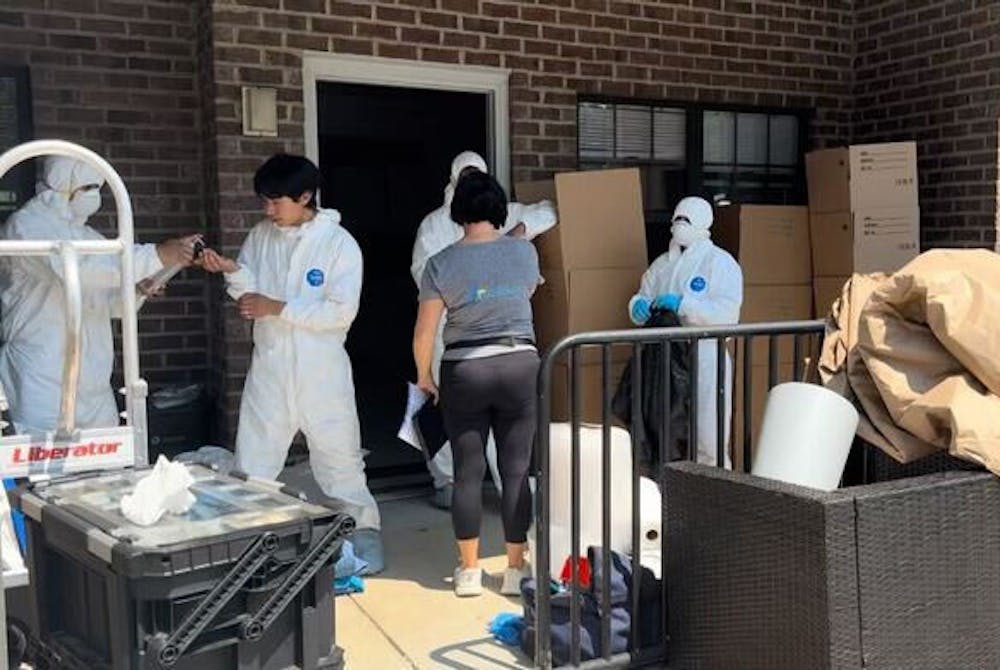Updated as of 6:49 p.m. on Sept. 3 to include video.
Kelly Reis, owner and operator of Blue Kangaroo Packoutz of Greensboro, arrived at West End Apartments on Aug. 27 to clean and clear out an apartment experiencing a mold outbreak.
“I would call this probably medium to heavy mold,” Reis said. “We're having to dispose of a lot of things that are covered in mold that can just not be cleaned. Upholstery sometimes is very hard to be cleaned, some wood is very difficult to be cleaned. But nothing that we haven't seen before.”
The apartment under remediation belongs to four Elon students, who found temporary housing in another West End Apartment.
West End Apartments are located just past MaGerk’s Pub on West Lebanon Avenue; the complex is not affiliated with Elon University and is managed by RedStone Property Management, a third-party property manager.
At 2:58 p.m. on Aug. 27, Redstone Property sent a text out to its residents addressing the remediation job.
“In an effort to alleviate concerns expressed by other residents in the building, we wanted to confirm the issue is in fact isolated to this one apartment and is a result of improper use of equipment,” the message wrote. “The apartments do not share ductwork, HVAC systems, or air space so this incident will not affect other units in the building. RedStone is addressing the situation to ensure the issue is resolved fully and promptly.”
According to Reis, the outbreak was caused by the air-conditioning unit being left on all summer.
Brandon Sowers, CEO of RedStone Property Management, refuted Reis’ statement — stating that the incident was not caused by the air conditioning being left on all summer, but rather by the system being used incorrectly.
According to Sowers, the thermostat was set with the fan in the 'on' position rather than in the 'auto' position, which is instructed in the lease agreement. The difference, Sowers wrote, is that tenants should not be under the impression that they cannot run their air conditioning during the hottest, humid months. Rather, tenants can leave their air conditioning on — but are instructed to leave it on in the ‘auto’ position.
“As stated in our notice to West End tenants, we have taken care to quickly address a singular and contained incident resulting from equipment misuse,” Sowers wrote. “We had reiterated the information noted in the lease addendum by placing stickers near EVERY thermostat before being made aware of the issue in the affected unit.”
In order to ensure tenants understand “the risk to health and property associated with improper HVAC equipment operation,” Sowers provided some tips to proper Heating, Ventilation and Air Conditioning operation:
- Change your filter every 30 days.
- Report any and all observable maintenance concerns immediately to your landlord/property manager.
- Always leave the fan in the AUTO position on the thermostat. When the fan is ON, you are circulating humid air into the home.
- Do not turn your AC off for extended amounts of time.
- Running your AC below 68 degrees may result in freezing the unit, resulting in no cool air.
- Do not obstruct vents and/or air returns. Doing so can result in poor air quality and potential damage to the system.
“I think it's important that RedStone's tenants are accurately informed on the correct way to use equipment, which we take seriously,” Sowers wrote. “We highly suggest any tenant with questions or concerns reach out to us directly.”
Reis said in order to clean the apartment, the crew had to pull out all of its contents before a separate restoration team can come in at a later time to clean the mold source. For students or residents returning to their dorms or apartments, or who are moving in for the first time, Reis strongly advised not to leave AC units on around the clock.
“The No. 1 thing, and I do notice that they have stickers now on from the summer, always have your AC on auto, do not ever put it on ‘on,’” Reis said. “Just do auto, take it down to the level that you want, it will automatically turn off. So that constant running all the time creates condensation, which then creates excess water — creating mold.”


